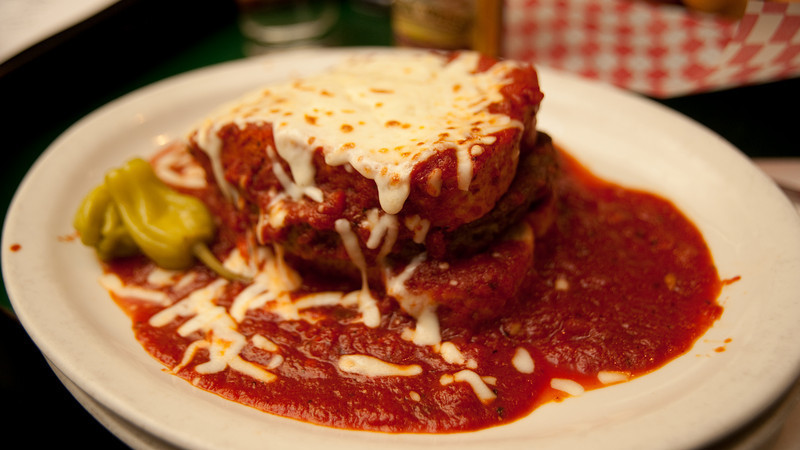St. Paul's "Hot Dago" Sandwich Offers No Apologies, Few Explanations, And A Half-Pound Of Sausage
Deep in the beating heart of what is probably America's politest state lies an edible contradiction. The Hot Dago sandwich of St. Paul, Minnesota, is a humble, honest, working class Italian-American dish that has been appearing on menus since the early 20th century. But the word "dago," a slur long slung toward Italian-Americans, also enrages some customers, particularly people visiting from out of town.
First, the sandwich: Like most folk food, there are aspects that are uniform, variations that give restaurants its identity, and long-standing arguments over which is tops in town. At its core, a Hot Dago is an Italian sausage patty between two slices of bread, almost always topped with marinara sauce and melted cheese. Some places add pepperoncini. Some use mozzarella, some provolone, some a blend. Some add onions. Some go for a mild patty, others amp up the heat until it's got a palpable kick. Some toast the bread aggressively, or add garlic. One thing that nearly every Hot Dago restaurant has in common: Italian-American ownership.On the website at Dusty's (in Northeast Minneapolis, one of the few non-St. Paul Dago establishments), they proudly boast: "Dusty's Bar and Dagos." Their version is essentially a sausage hamburger, without the splash of sauce, easy to pick up and eat. DeGidio's (on the main drag of St. Paul's old-school Italian eateries) drowns their version in sauce and cheese, creating a dish that requires a fork and knife. I've also encountered places that do a reasonably neat Hot Dago that can be ordered "sloppy" if you want to drown your dish in cheese and sauce.
The Hot Dago isn't a gimmick or a relic—it remains a popular entree today. And look at the ingredients; how can it not be delicious? Seasoned Hot Dago practitioners consider the balance of marinara's sweetness with peppers' acidic bite, while managing the proportions between bread, cheese, and sauce to achieve harmony. Spicy heat is a plus. For my money, I think DeGidio's does a killer version, as does Brianno's Deli-Italia, a real-as-it-gets spot out in Eagan, a Minneapolis-St. Paul suburb.Still, one can't discuss the sandwich without acknowledging the name, a word that remains a slur to this day. "Dago" has its origin from Diego, which comes from the Latin Jacobus. English deckhands in the 19th century were known as "Jack"; their Portuguese and Spanish counterparts were called Diego, later adapted to Dago and used as a derogatory name for all Italians in the United States. By the latter part of the 19th century, mobs were lynching Italian immigrants—11 were hanged in New Orleans in 1891, in front of a mob chanting "hang the dagos." Somewhere between 1891 and the present day, the word dago went on a journey, decreasing in toxicity. As Italian-Americans became increasingly seen as fully assimilated, "dago" was used less frequently in anger as a slur, and more commonly as an in-joke between countrymen. In the insular Italian-American community of St. Paul, it never seems to have taken on the same virulence that it possessed in other parts of the country. "Here [in St. Paul], it's not derogatory," said Jason Tschida, a co-owner of DeGidio's. Though not Italian himself, he married into the DeGidio clan and presides over a restaurant that counts Hot Dagos among its most popular menu items. "[Italian-Americans in St. Paul] just grew up with it—they would call wines "dago red"—it wasn't derogatory for them. When they heard someone from the East Coast or West Coast say it was derogatory, they'd be like: 'What are you talking about?'"
As for the culinary side of the Hot Dago, Tschida said: "It's got to have a good kick, it's got to be a little spicy—that's what defines a Dago. We do a half-pound patty between two slices of Vienna, we douse it with our red sauce and we melt mozzarella cheese over it with two pepperoncini."Tschida seems to be one of the St. Paulites who'd speak openly about the Hot Dago, which for decades, has pitted those who take offense to the word and the restaurateurs that openly embrace—they'd say reclaim—that word. Every few years, it seems local press revisit the controversy, which if anything, keeps the sandwich in the public eye. In 2007, the director of the St. Paul Human Rights Department even tried to get the name removed through a city ordinance. An attorney for DeGidio's told the St. Paul Pioneer-Press: "Doesn't this guy have anything to do?" (A few thousand miles east in New York, an Albany food truck called "Wandering Dago" won a ruling in federal court this past January, allowing them to serve near the state Capitol after Gov. Andrew Cuomo's administration had barred them.)
Still, the sandwich remains on at least a half-dozen menus in the area, and on many others with sanitized aliases. If you come to St. Paul and order a Hot Italiano or a Hot Paisano, you're getting the same dish served with less baggage.
Controversy, of course, can provoke curiosity. Some would call that smart marketing. In 2015, a Chicago restaurant named itself "Chop Chop Chinaman," which provoked one passerby to scribble an obscenity on the storefront window with lipstick. That person was later charged with a misdemeanor, which set off media attention from across the country.
Tschida of DeGidio's said the sandwich's name can be a selling point. "I get people in from Boston and New York and other places," he said, "and they come in and ask: 'Can I take a menu home to show my friends?'"
